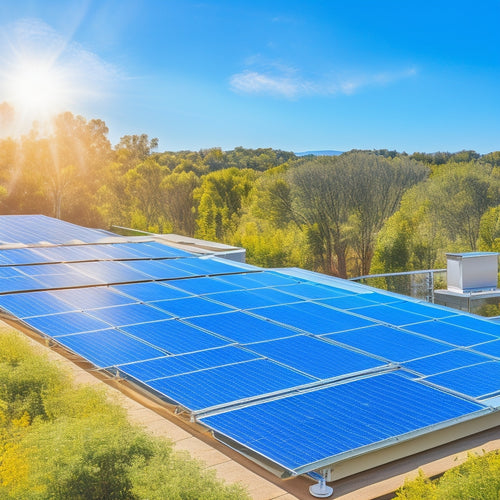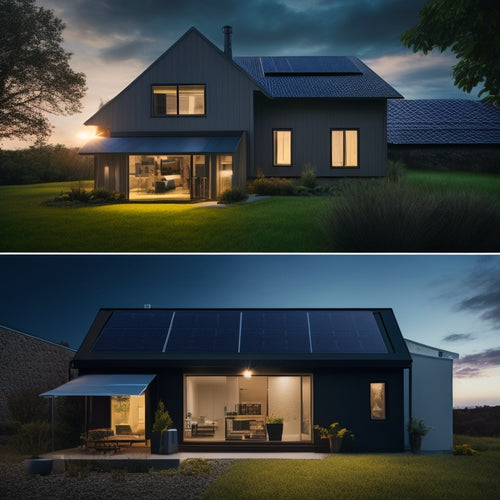
Top Eco-Friendly Camping Equipment for a Sustainable Adventure
Share
When you're camping with the planet in mind, opt for eco-friendly gear like tents made from recycled materials and biodegradable cookware. Lightweight options like hemp backpacks not only reduce your carbon footprint but also enhance your outdoor experience. Look for durable items that require less frequent replacement, saving you money and resources. Choose solar-powered lanterns and organic cotton sleeping bags to align your journey with sustainable practices. By supporting responsible brands, you contribute to ethical production. Join us as you adopt these choices for a fulfilling, green escape into nature that respects our environment.
At a Glance
- Choose tents made from recycled materials or organic cotton for durability and reduced environmental impact.
- Opt for biodegradable utensils and toiletries to minimize waste during your outdoor adventure.
- Select lightweight backpacks crafted from eco-friendly materials to lower transportation fuel needs and enhance comfort.
- Invest in solar-powered lanterns to promote sustainable energy use while camping.
- Look for camping gear with eco-friendly certifications, ensuring responsible material choices and long-lasting durability.
Sustainable Material Sourcing Advantages
When you choose camping gear made from sustainably sourced materials, you're actively reducing your environmental impact.
Plus, you're supporting ethical practices that prioritize fair labor and responsible sourcing.
This not only benefits the planet but also enhances your outdoor experience, knowing you're making a positive choice.
Reduced Environmental Impact
As you gear up for your next outdoor outing, consider how choosing eco-friendly camping equipment can greatly reduce your environmental impact. By opting for gear made from sustainable materials, you're supporting eco-friendly innovations and sustainable technologies that minimize harm to our planet.
When you invest in products sourced responsibly, you're not just getting quality equipment; you're also encouraging the use of renewable resources and reducing waste. Here's a quick look at the advantages of eco-friendly camping gear:
| Material | Environmental Benefit | Example Gear |
|---|---|---|
| Recycled Fabrics | Reduces landfill waste | Backpacks, tents |
| Bamboo | Fast-growing, renewable | Utensils, plates |
| Organic Cotton | Low pesticide use | Sleeping bags, clothing |
| Biodegradable Plastics | Breaks down naturally | Cookware, storage containers |
Choosing equipment that incorporates these features lets you investigate the great outdoors while protecting it for future generations. So, as you plan your next journey, remember that every small choice contributes to a larger impact on the environment. Let your camping gear reflect your commitment to a sustainable lifestyle!
Supporting Ethical Practices
Choosing camping gear that promotes ethical practices not only enhances your outdoor experience but also aligns with your values. When you opt for equipment made from sustainably sourced materials, you're contributing to a healthier planet. Ethical sourcing means that the materials used are obtained in ways that respect both the environment and the workers involved in the production process.
By selecting brands that prioritize fair trade, you guarantee that artisans and laborers receive fair wages and work in safe conditions. This not only strengthens communities but also nurtures a more equitable global economy.
Plus, when you choose gear created with care, you often find it's made to last, reducing the need for frequent replacements.
Imagine hiking with a tent made from recycled materials or sleeping under a blanket crafted by artisans who are fairly compensated. It's not just about comfort; it's about making a statement.
Environmental Impact Reduction
When you choose lightweight gear for your camping trips, you not only lighten your load but also reduce your carbon footprint.
Utilizing sustainable power for camping through portable solar lights can further minimize your environmental impact.
Opting for biodegradable camping essentials guarantees that your waste won't linger in nature long after you've packed up.
Together, these choices make a significant impact on preserving the environment for future explorers.
Lightweight Gear Advantages
Opting for lightweight camping gear can considerably reduce your environmental footprint while enhancing your outdoor experience. By choosing ultra lightweight tents and compact cooking gear, you not only lighten your load but also minimize resource consumption. Less weight means less fuel is needed for transportation, which directly translates to lower carbon emissions.
Here's a quick look at the benefits of lightweight gear:
| Advantages | Impact |
|---|---|
| Reduced Material Use | Less waste generated in production |
| Easier to Carry | Encourages discovery and freedom |
| Lower Carbon Footprint | Decreases environmental impact |
When you pack lighter, you're more likely to venture off-the-beaten-path locations, connecting deeply with nature. The convenience of compact cooking gear allows you to whip up meals with minimal impact, ensuring you leave no trace. Plus, lightweight gear often means quicker setup and takedown, giving you more time to enjoy the great outdoors.
Embrace the spirit of exploration while being kind to the planet. With every step you take, you're making a conscious choice for sustainable camping.
Biodegradable Camping Essentials
As you adopt lightweight camping gear to lessen your environmental impact, consider incorporating biodegradable camping essentials into your kit. These items not only help you enjoy nature but also guarantee you leave no trace behind.
Start with biodegradable utensils. These eco-friendly alternatives break down naturally, minimizing waste and reducing the burden on landfills after your trip. You can enjoy your meals guilt-free, knowing you're making a positive impact.
Next, think about an eco-friendly tent. Look for options made from sustainable materials that are designed to last, reducing the need for replacements. Many of these tents are also lightweight, making them easier to carry on your excursions.
Additionally, don't overlook biodegradable toiletries. From soaps to toothpaste, these products ensure that even your personal care routine aligns with your commitment to sustainability.
Eco-Conscious Design Benefits
When you choose eco-conscious camping gear, you're not just enhancing your outdoor experience; you're also reducing your environmental impact.
By opting for sustainable materials, you support practices that protect our planet while enjoying nature.
Additionally, utilizing renewable energy sources, such as solar-powered camping lights and equipment, can further minimize your ecological footprint energy storage solutions.
These thoughtful design choices guarantee your equipment isn't only functional but also kind to the Earth.
Reduced Environmental Impact
Over the years, eco-conscious design has converted camping gear into tools that not only enhance your outdoor experience but also protect the environment. When you choose eco-friendly equipment, you're embracing minimalist camping, which prioritizes simplicity and function. This approach allows you to enjoy nature without the clutter of unnecessary items, making your journey more fulfilling and less wasteful.
By opting for gear designed with a reduced environmental impact in mind, you're actively participating in a zero waste lifestyle. Many brands now create products using sustainable practices, ensuring that your choices align with your values. From biodegradable tents to reusable utensils, this gear minimizes waste and reduces your carbon footprint.
As you set out on your next camping trip, consider the benefits of selecting eco-conscious items. Not only will you enjoy a more streamlined experience, but you'll also contribute to the preservation of the beautiful scenery you love.
You're not just a camper; you're a steward of the environment. So, gear up with purpose and head out with the knowledge that you're making a positive impact while enjoying the freedom of the great outdoors.
Sustainable Material Choices
Choosing sustainable materials for your camping gear can make a significant difference in your outdoor excursions. By opting for products made from recycled materials and natural fibers, you not only reduce your environmental footprint but also enhance your experience in the great outdoors. These eco-conscious choices promote durability and comfort, allowing you to investigate freely and responsibly.
Here's a quick overview of sustainable material choices to reflect on for your camping escapades:
| Material Type | Benefits |
|---|---|
| Recycled Materials | Diverts waste from landfills, reduces resource consumption |
| Natural Fibers | Biodegradable, breathable, and comfortable |
| Hemp | Strong, durable, and requires minimal water |
| Recycled Polyester | Lightweight, quick-drying, and less energy-intensive to produce |
Incorporating these sustainable materials in your camping gear means you can enjoy nature while protecting it. Every choice counts, and by choosing wisely, you can make your escapades more sustainable and fulfilling. So gear up with eco-friendly options, and let your outdoor spirit soar!
Selecting Based on Durability
When you're choosing eco-friendly camping gear, material quality should be at the top of your list.
Opt for durable materials that not only withstand the elements but also require less frequent replacement, saving you money and resources in the long run.
Additionally, incorporating eco-friendly camping gear can enhance your outdoor experience while reducing environmental impact.
Plus, understanding how to maintain your equipment can greatly extend its lifespan, making your outdoor excursions more sustainable.
Material Quality Importance
Selecting camping gear made from high-quality materials guarantees you're investing in durability and longevity. When you choose equipment with superior material durability, you're making certain that it can withstand the elements and the rigors of outdoor excursions. This not only enhances your experience but also minimizes the need for replacements, making your camping trips more sustainable.
Look for products that carry eco-friendly certifications, as these often indicate that the materials used are both environmentally responsible and designed to last. For example, gear made from recycled materials or responsibly sourced fibers not only reduces your carbon footprint but also contributes to a healthier planet.
Consider how each piece of equipment will hold up over time. A well-constructed tent, sturdy cookware, or durable sleeping bag can make all the difference in your comfort and safety while camping.
When you invest in quality gear, you're choosing freedom over frustration—freedom to roam without the worry of gear failure. Prioritizing material quality makes certain you're prepared for whatever nature throws your way, allowing you to focus on what truly matters: enjoying your journey.
Lifespan and Maintenance Tips
Durability is key to enjoying a hassle-free camping experience, and understanding the lifespan of your gear can greatly improve your excursions. By selecting equipment built to last and implementing effective longevity strategies, you can guarantee your journeys are both enjoyable and sustainable. Here are some essential tips to keep your gear in top shape:
| Gear Type | Lifespan (Years) | Maintenance Tips |
|---|---|---|
| Tents | 5-10 | Clean after each use; store dry. |
| Sleeping Bags | 5-15 | Use a liner; avoid compression. |
| Cookware | 5-20 | Avoid metal utensils; hand wash. |
| Backpacks | 5-10 | Check straps; repair seams. |
| Lanterns | 3-10 | Store batteries separately; clean regularly. |
Incorporating simple repair techniques can also extend your gear's life. Patch up small tears in tents and backpacks promptly, and regularly check zippers and seams. By staying proactive and mindful about maintenance, you'll enjoy many journeys without the hassle of replacing worn-out gear. Accept the freedom of the outdoors with well-cared-for equipment!
Lower Carbon Footprint Overall
When you're choosing camping gear, consider opting for equipment made from renewable materials.
Not only do these options reduce waste, but they also help lower your overall carbon footprint.
Choose Renewable Materials
How can choosing renewable materials for your camping gear markedly reduce your environmental impact? When you opt for items made from sustainable materials, you're not just enjoying the great outdoors; you're actively contributing to its preservation.
Biodegradable options, like tents crafted from organic cotton or sleeping bags filled with recycled fibers, break down naturally, minimizing waste in landfills.
Sustainable innovations are popping up everywhere in the camping world. Think solar-powered lanterns made from recycled plastics or cooking gear crafted from bamboo.
These choices not only lessen your carbon footprint but also promote a circular economy, where materials are reused rather than discarded.
By selecting gear made from renewable resources, you're supporting brands that prioritize eco-friendliness, helping to push the entire industry toward greener practices.
Plus, you'll feel a sense of freedom knowing you're camping responsibly.
Frequently Asked Questions
What Are Some Brands Known for Eco-Friendly Camping Gear?
When you're looking for sustainable brands in camping gear, consider companies like REI, Patagonia, and Big Agnes. They focus on eco-conscious materials, ensuring your outdoor excursions are both enjoyable and environmentally responsible.
How Can I Properly Recycle Old Camping Equipment?
To recycle old camping gear, find local recycling centers that accept specific materials. Consider donation options for usable items to help others. This way, you're giving your gear a second life while reducing waste.
Are Biodegradable Tents Available on the Market?
Yes, biodegradable tents are available! These innovative designs use biodegradable materials, allowing you to enjoy nature without leaving a trace. Adopt sustainable design and camp freely, knowing your gear won't harm the environment.
What Should I Look for in Sustainable Sleeping Bags?
When choosing sustainable sleeping bags, look for insulation materials like recycled polyester or organic cotton. Check temperature ratings to guarantee comfort in various climates, so you can enjoy your escapades without compromising your eco-friendly values.
How Can I Minimize Waste While Camping?
When you camp under a starlit sky, adopt leave no trace practices and whip up zero waste meals. Pack reusable containers, choose biodegradable items, and leave nature as untouched as you found it. Enjoy freedom responsibly!
Explore More
By choosing eco-friendly camping equipment, you're not just gearing up for an expedition; you're making a conscious choice to protect our planet. It's a win-win situation where you enjoy the great outdoors while minimizing your environmental impact. Remember, every little bit counts, and when you opt for sustainable gear, you're putting your money where your mouth is. So, pack wisely and tread lightly—your eco-conscious choices will pave the way for a greener future for all.
Related Posts
-

What Types of Solar Energy Devices Are Available
You'll find several types of solar energy devices available today, each customized to different energy needs. Photovo...
-

Cost of Solar Panel Installation
You can expect to pay between $15,000 and $30,000 or more for a typical solar panel installation, depending on the sy...
-

Cost of Home Solar Battery
You're looking to invest in a home solar battery to reduce your grid reliance, but you're curious about the cost. The...


